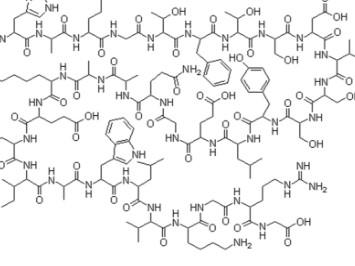March 22, 2021
Tag:
Glucagon-like peptide-1 (GLP-1), a brain-gut peptide involved in ileal endocrine disorders and somatic cell-based metabolism, is currently a key target for drug efficacy in type 2 diabetes mellitus.
Because GLP-1 can inhibit the stomach and intestines, reduce the stomach and intestines, so it is helpful to control eating and relieve weight loss.
In an innovative placebo-controlled, randomized, double-blind, sideline study of obese patients, the introduction of GLP-1 dermatological agents increased satiety after meals and reduced the amount of food served per meal by an average of 15%.
However, because GLP-1 is an active peptide, it is a great pity that it cannot be orally administered.

Efficacy
What are GLP-1 growth habits?
How to make full use of hypoglycemic effect?
Scientific research has determined that glucagon promotes insulin metabolism of pancreatic beta cells in a value dependent way of glucose water concentration, and reduces glucagon metabolism of pancreatic alpha cells, so as to reduce blood sugar.
But for type 2 diabetes, and its "intestinal promote pancreatic hormone effect" damage, main show is after a meal glp-1 level was high value than ordinary people reduce to a certain extent, but its promoting insulin secretion and lower blood lipid effect is not obvious, therefore glp-1 and its analogues can be used as a treatment for type 2 diabetes is an important target.
Use the following several aspects fall hematic fat action glp-1 have the function of the maintenance of beta cells glp-1 can effect on liver bilges beta cells, promote the insulin gene heredity gene expression and insulin into and metabolism and can stimulate the liver bilges beta cell differentiation and collapse, inhibiting liver bilges beta cell apoptosis, improve liver bilges beta cells.
In addition, GLP-1 can also inhibit the release of glucagon in hepatic distention α cells, and promote the metabolism of somatostatin in hepatic distention δ cells. Somatostatin can also participate in the inhibition of glucagon metabolism as a parsecretory child growth hormone.
Glp-1 has the glucose density value dependence im fall hematic fat action as a source of the female hormone, glp-1 is in trace elements is sugar chemicals are released under the stimulus of in and out of the blood, and its effect on promoting insulin secretion in the glucose density value dependence on blood glucose levels after everything is ok, though still continuously drip glp-1, patients insulin level is not easy to rise again, blood sugar levels stable, has no further reduce.
This indicates that GLP-1 has a value-dependent effect of lowering blood lipid, that is, only when the blood glucose level is increased can GLP-1 fully use its effect of lowering blood lipid, while when the blood glucose level is normal, it is not easy to further reduce it.
GLP-1's ability to reduce blood lipid in the dependence of glucose water concentration value is the basis and guarantee of its safety performance in clinical medicine, so as to avoid people's concern that the current treatment drugs and programs for diabetic patients may cause serious hypoglycemia in patients.

In addition, GLP-1 also has many other growth habits and effects. For example, GLP-1 is likely to make full use of the effect of lowering blood lipids and thus lead to the maintenance of the central nervous system.
It can also be based on the central nervous further learning and memory function, maintenance of the nervous system.
Little imagine, to apply glp-1 in clinical medicine professional also suffer the problem, that is caused by the body's own glp-1 easily by human body dipeptide base peptidase Ⅳ (DPP - Ⅳ) dissolved, its blood drug half-life, less than two minutes to continuous intravenous drip or continuous injection can lead to skin tissue, this greatly limits the application of clinical medicine specialty of glp-1.
To solve this problem, experts have long identified two solutions. One is to design and develop GLP-1 analogues that both act as GLP-1 and resist dissolution.
Secondly, the design development of DPP - Ⅳ retarding agent, the metabolism of the body's own glp-1 is not dissolved.
At present, these two aspects of scientific research have long been a certain progress.
We firmly believe that with the research on GLP-1 signaling system in many aspects, many new targets will be found, so as to design and develop a lot of new drugs for the treatment of diabetes, so as to benefit diabetic patients.
If you have any peptide synthesis requirement in mind, please do not hesitate to contact: sales@gotopbio.com. We will endeavor to provide highly satisfying products and services.


Contact Us
Tel: (+86) 400 610 1188
WhatsApp/Telegram/Wechat: +86 13621645194
Follow Us:




 Pharma Sources Insight January 2025
Pharma Sources Insight January 2025


